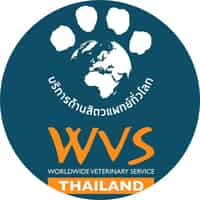Stray dogs in Chiang Mai
Chiang Mai, a city where hundreds of stray dogs roam the streets without protection. The public portrays strays as dangerous, as they have a history of attacking people walking around the city. Strays with rabies pose an additional threat to human welfare, as rabies is fatal without proper vaccination and immediate treatment.
The abundance of stray dogs is a critical health and safety concern in Thailand. In Chiang Mai province alone, there are believed to be 70,000 stray dogs, most of which lack precautionary vaccinations and are unlikely to be sterilised, in spite of the numerous government sponsored and charity driven programmes. The absence of these procedures among strays can lead to disease outbreak and stray overpopulation.
Worldwide Veterinary Service, WVS Thailand
Worldwide Veterinary Service, or WVS, a UK based foundation that helps shelter dogs in Chiang Mai, is committed to providing appropriate assistance for strays. WVS aims to reduce overpopulation of street dogs by providing sterilisation and spraying programmes, facilitating local adoptions, and operating a rescue centre. The foundation hopes to improve the health status of homeless dogs through vaccinations, proper medical care, and halting the dog meat trade.
Currently, the shelter houses 20 dogs, all of which are badly injured and infected with serious diseases. Strays account for 60% of the dogs housed in the centre. Due to high demand, WVS Thailand is not able to shelter dogs permanently. Instead, the operation focuses efforts on stabilisation and vaccination. Once treated, the centre releases dogs and offers care to new canine patients.
Ways the WVS plans to achieve their goals
WVS Thailand focuses on three effective approaches, sterilisation, vaccination and release, to limit stray overpopulation and promote canine health.
Sterilisation, which prevents dogs from breeding, aims to limit stray birth rates. WVS stabilises and vaccinates 20 dogs each day. According to research in India, small numbers of unsterilised dogs can lead to population explosions. The research implies that human control is essential to sustain the quality of life for homeless dogs. The efforts of WVS Thailand has reduced the number of strays by 20,000 in the past four years.
In 2018, the Department of Livestock Development, DLD, announced that there are 400 confirmed cases of rabies in Thailand, with three cases resulting in human fatality. However, rabies is preventable as long as dogs receive vaccinations. The centre has vaccinated more than 70,000 dogs in the past four years.
The last approach, release, consists of releasing treated dogs back to the areas they were initially rescued. This phase is particularly sensitive, as the WVS has to ensure there are no territorial conflicts between treated dogs and settled dogs. The centre prioritises the physical and mental safety of the treated dogs.
Adoption
WVS Thailand has an adoption system, in which people can foster dogs sheltered in the centre. WVS places a strong emphasis on ownership responsibility. The centre screens future owners to determine if they are qualified caregivers. The screening process is in place to discourage owners from returning dogs to the shelter since the dogs can be emotionally damaged if abandoned by foster homes.
Challenge
WVF Thailand is highly devoted to dog care in Chiang Mai. However, Ian Clarke, the director of operations at WVS Thailand, said, “our challenge is Thai law, legal development that does not require people to have a license to breed dogs. Meanwhile, WVS has to deal with education to teach people how to be more pet-centered minded. In the long run, we will be focusing on that and how to keep the welfare safe”.
The law in Thailand fails to enforce owner responsibility and does not require breeders to apply for licenseship. While a law has been proposed that would require dog and cat owners to register their pets, the Prime Minister’s office has stated it has yet to be passed.
WVS frequently coordinates workshops to educate people on how to be responsible owners and to expand the network of stray dog protection. This year, WVS Thailand will visit Yangon, Myanmar to set up a fundamental protection system to suppress the overpopulation of stray dogs.
Further information
Normal office hours:
9:30am – 4:30pm Mondays to Saturdays, close on Thai holidays
+66 (0)90 320 7317 (English & Thai) www.carefordogs.org/







